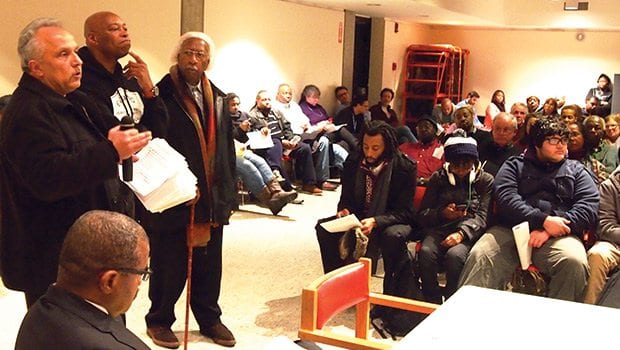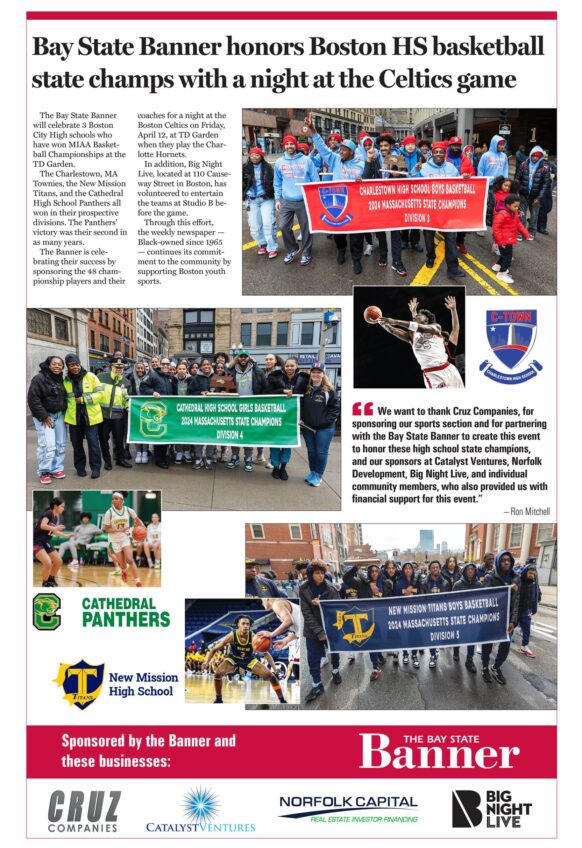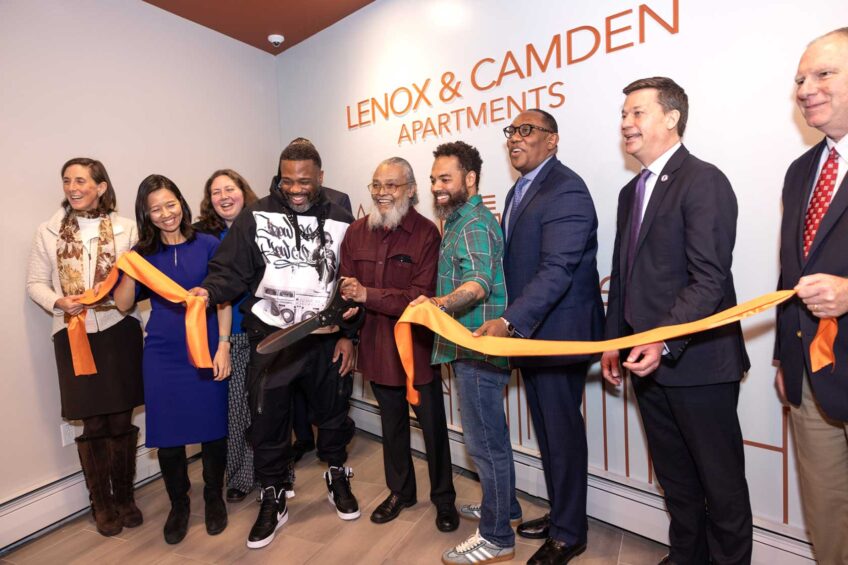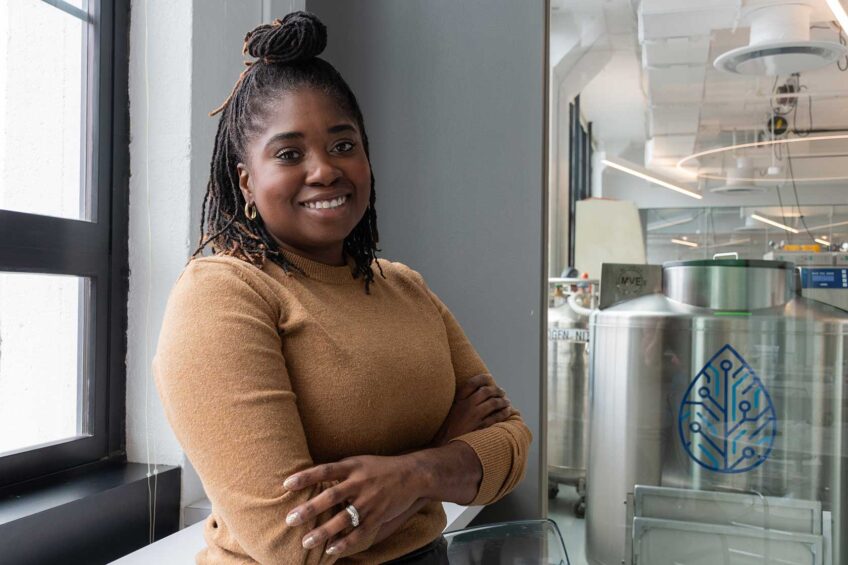
A coalition of community and labor activists packed the Roxbury Strategic Master Plan Oversight Committee meeting Monday, making a push for higher wages on projects developed in Roxbury.
Although several development projects were discussed at the meeting, the prevailing issue of the night became the matter of fair wage standards for construction and other jobs created by new development projects in Roxbury.
Members of the Committee began the meeting with an announcement that they would not hold a vote that night on the so-called Good Jobs Standards, a set of criteria coalition members are proposing for worker wages for all future projects approved by the RSMPOC. Committee member Jorge Martinez said that a vote on the matter of Good Jobs Standards would be held at a meeting on March 16 instead.
The gathering was a monthly public meeting of the RSMPOC, a 16-member body representing the Roxbury community. It was attended by an estimated two hundred people, who filled all the seats and stood around the edges of the meeting room at the Dudley Square Library.

Members of the Good Jobs Standards working group address reporters before the Monday meeting of the Roxbury Strategic Master Plan Oversight Committee at the Dudley Library.
The announcement of the delayed vote on the Good Jobs Standards proposal brought a chorus of boos from the audience. Prior to the meeting, Priscilla Flint Banks of the Black Economic Justice Institute told the Banner that after a concerted push from advocates on the issue, she expected a vote, and if one was not held, there “should be an outcry from the community.”
While Monday’s meeting included status updates on four development projects, it was the proposal for a hotel on Parcel 9, a piece of public land located at the intersection of Melnea Cass Boulevard and Washington Street, that prompted the greatest audience reaction. The hotel project has been in development since 2011, and has secured support from the various required parties, including preliminary approval from the Boston Redevelopment Authority and approval from the RSMPOC.
But elected officials, including City Councilor Tito Jackson, who last year supported the project, are now withholding support, demanding that the hotel project agree to provide union jobs, a condition developers say no hotelier would agree to. The RSMPOC has also voted in support of the project.
During the Parcel 9 presentation, Kamran Zahedi of Urbanica, the developer behind the project, and Darryl Settles, President of Catalyst Ventures and one of the equity partners in the project, laid out the proposal’s parameters. They specified that for all permanent jobs at the hotel, the hotel operator has committed to hourly wages ranging from $13.90 to $25.40, with an added $1 per hour increase each year during the first three years of hotel operation.
Economic justice
Zahedi and Settles emphasized that these rates exceeded Boston’s Living Wage Standards, an official rate set by an ordinance in effect since 1998 that ensures that employees of city contracted vendors earn an hourly wage sufficient for them to live at or above the poverty line. The Living Wage is currently $13.89.
Audience members punctuated the presentation with cries that such wages were still not enough to live on in Boston. During the 30-minute audience comment period reserved for the end of the meeting, attendees spoke more fully. One woman described her experience working her way up the wage ladder as a construction worker and the excitement of finally being able to purchase groceries without the public assistance on which she was raised. An hourly wage of “$13.90 is not a living wage,” she said. “It is not — I’ve tried it. I couldn’t afford to live in the city that I’m from.”
The issue of wages at the hotel was complicated due to timing matters. Although the project for Parcel 9 has been in development since 2011, Zahedi said that the issue of wage standards was not laid out during the initial bid process for the project and only recently was introduced by activists, after developers had spent four years on the project.
“If they wanted to have a fair wage hotel, they should have said it then,” he said, to which the audience responded with boos.
State Senator Sonia Chang-Diaz, one of the elected officials who serves ex officio on the panel, responded to this claim in a conciliatory tone.
“I’m not unsympathetic to your plea as developers,” she said. “I regret that it was a question that this body didn’t ask earlier.”
However, she also clarified that while “it is late in the process, it’s an important question” to raise. State Rep. Evandro Carvalho and Jackson cited similar concerns about wages that they had heard from their constituents, with Jackson countering Zahedi’s claim that “other hotels pay $11 per hour” with his own claim that the prevailing hourly wage in Boston hotels is actually $18.50.
Gentrification fears
Wearing an “Entering Roxbury” sweatshirt and emphasizing his more than 30 years in the neighborhood, Settles sought to frame the issue as one of communal progress. He said that while he understood “what’s been asked” regarding wage standards, “there is a reality check that needs to happen to make the project feasible,” which he illustrated by describing the steep competition to obtain financing for a hotel in Roxbury compared to a hotel in supposedly more desirable areas such as Downtown Boston.
“We’ve been waiting for development,” he said, referencing the “strides, effort and the pain” that have gone into realizing the dream of a revitalized Roxbury. “It’s been four, five times [before] that we’ve said, ‘Roxbury is gonna happen.’”
Still, those who stood to voice their opinion during the audience feedback portion of the evening were forceful in their queries of who stood to benefit from the plan.
“I’m watching gentrification take over the city,” one woman said to the panel of straight-faced Committee members. “We should want beautiful new buildings, and deep inside of me I’m excited, but I’m also angry because people like me will never enjoy it,” she concluded to a roar of claps from the audience.
Another woman addressed the RSMPOC directly, describing the perception among many that members of the Committee were more in favor of the developers. “If you’re not here for the community, please step down,” she said as she reached the mic. “We’ll find somebody new.”






